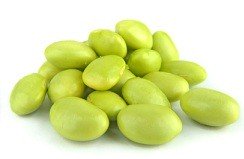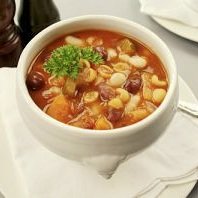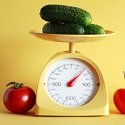Lose Weight
![]() Calories in Food
Calories in Food
![]() Calories in Vegetables
Calories in Vegetables
![]() Calories in Soybeans
Calories in Soybeans
Calories in Soybeans,
Soybean Nutrition
How many calories in Soybeans? See below, the Soybeans calories for the different serving sizes. We provide you with the Soybean nutrition facts and the health benefits of Soybeans to help you to lose weight and eat a healthy diet.
Soybeans (US) or Soya Beans (in the UK) are a member of the legume
family and used, amongst other things, for making soy milk, soy sauce
and tofu.
Soybeans are a fantastic source of protein – approx. 36g
per 100g. They also provide an excellent source of vitamins B6 and K,
calcium, iron, magnesium, phosphorus, potassium, zinc, manganese and
fiber.
Soybeans are believed to help prevent cancer given the presence of natural phenols. Other health benefits of Soybeans include lowering bad cholesterol (LDL), according to the FDA, and also helping to lower blood pressure.
Below we have four calorie tables covering the different cooking methods. We also have a detailed nutrient table. See our vegetable calories comparison chart to compare the calories in Soybeans with the calories in other vegetables.
Also, have a look how nutritious Soybeans are when compared to the nutrition in other vegetables.
All of our calorie and nutrition data is provided by the US Department of Agriculture.

Calories in Soybeans, Green, Raw
Refuse: 47% (Pods)Scientific Name: Glycine max
| Serving Size | Calories per Serving |
| 100 grams | 147 kcal (614 kJ) |
| 1 cup, 256 grams | 376 kcal (1572 kJ) |
Soybeans, Green, Cooked, Boiled, Drained
Refuse: 0%| Serving Size | Calories per Serving |
| 100 grams | 141 kcal (590 kJ) |
| 1 cup, 180 grams | 254 kcal (1062 kJ) |
Soybeans, Mature Seeds, Raw
Refuse: 0%| Serving Size | Calories per Serving |
| 100 grams | 446 kcal (1866 kJ) |
| 1 cup, 186 grams | 830 kcal (3471 kJ) |
Soybeans,Mature Cooked, Boiled
Refuse: 0%Common Name: Soy nuts
| Serving Size | Calories per Serving |
| 100 grams | 451 kcal (1889 kJ) |
| 1 cup, 172 grams | 776 kcal (3249 kJ) |
Soybeans Nutritional Information
| Nutritional value per 100 g (3.5 oz) | |
|---|---|
| Proximates: | |
| Water | 60.21 g |
| Energy | 686 kJ (164 kcal) |
| Carbohydrates | 27.42 g |
| Sugars | 4.8 g |
| Dietary fiber | 7.6 g |
| Fat | 2.59 g |
| Protein | 8.86 g |
| Minerals: | |
| Calcium, Ca | 49 mg (5%) |
| Iron, Fe | 2.89 mg (16%) |
| Magnesium, Mg | 48 mg (12%) |
| Phosphorus, P | 168 mg (17%) |
| Potassium, K | 291 mg (6%) |
| Zinc, Zn | 1.53 mg (10%) |
| Copper, Cu | 0.352 mg (18%) |
| Manganese, Mn | 1.030 mg (52%) |
| Selenium, Se | 3.7 mcg (5.3%) |
| Vitamins: | |
| Vitamin C | 1.3 mg (2%) |
| Thiamine (Vit. B1) | 0.116 mg (8%) |
| Riboflavin (Vit. B2) | 0.063 mg (4%) |
| Niacin (Vit. B3) | 0.526 mg (3%) |
| Pantothenic acid (B5) | 0.286 mg (3%) |
| Vitamin B6 | 0.139 mg (7%) |
| Folate (Vit. B9) | 172 mcg (43%) |
| Vitamin A | 27 IU (0.5%) |
| Vitamin E | 0.35 mg (1.8%) |
| Vitamin K | 4 mcg (5%) |
| Percentages are relative to US Recommended Daily Intake (RDI) for adults. | |
Author: Lana Soko
You Might Also Like:
Like This Page?
|
Share This Page:
|
Search Our Site:

Free E-Book:
We Recommend:
Fat Loss 4 Idiots

Imagine losing in just 11 days up to 9 pounds in weight. You’ll learn how to ensure your metabolism keeps going so your body loses more fat.

 |




